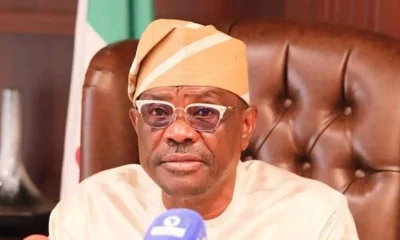Judiciary
Judiciary funds must be deducted directly from source by AGF – JUSUN insists

The Judiciary Staff Union of Nigeria (JUSUN) on Thursday insisted that each state must implement its self-accounting law in dealing with Internally Generated Revenue.
JUSUN, in a statement issued by its General Secretary, I. M. Adetola, in Kaduna, said:”each state should implement its self-accounting law or Fund Management law in dealing with IGR also known as state consolidated fund, in accordance with Section 121(3) of the 1999 Constitution of the Federal Republic Nigeria as amended.
”The states that have not yes signed the Bill into law should do so without delay.” JUSUN said
Furthermore, the JUSUN maintained that amount standing to the credit of the judiciary from the monthly federal allocation should be deducted directly from the source by Accountant General of the Federation and remit same to National Judicial Council (NJC) for onward transmission to heads of courts
“For the Federal Allocation, the Budget of each State Judiciary submitted to the implementation committee (received on Oct. 2, 2020) should be implemented by deducting the amount due to the state judiciary directly from source by Accountant General of the Federation.
”This is in accordance with Section 81(3), Section 162(9) of the 1999 Constitution of the Federal Republic Nigeria (as amended) for the states. The Accountant General of the Federation should be directed accordingly.
The union also said that the implementation requested above should include payment of the arrears from the month of October, 2020
Our correspondent reports that JUSUN on April 6, following a directive on its members to shut down all courts across the country, members complied with the directive and mounted guard at the entrance of the courts to ensure that no one entered the court premises.
The action has crippled court proceedings as well as commercial activities around the court premises.
Our correspondent reports that a verdict of the Federal High Court in Nigeria’s capital, Abuja, had in January 2014, held that financial autonomy for the judiciary is a constitutional provision that must be complied with by the executive branch of government.
Our correspondent reports that on May 23, President Muhammadu Buhari signed into law the Executive Order to grant financial autonomy to the legislature and the judiciary across the 36 states of the country.
The order also mandates the accountant-general of the federation to deduct from source amount due to state legislatures and judiciaries from the monthly allocation to each state for states that refuse to grant such autonomy.
The Minister of Justice, Abubakar Malami, the Executive Order No. 10 of 2020, made it mandatory that all states of the federation should include the allocations of both the legislature and the judiciary in the first-line charge of their budgets.
According to the AGF, “a Presidential Implementation Committee was constituted to fashion out strategies and modalities for the implementation of financial autonomy for the State Legislature and State Judiciary in compliance with section 121(3) of the Constitution of the Federal Republic of Nigeria, 1999 (as Amended).”
Our correspondent report that the Nigeria Governors Forum (NGF) on Thursday said they will start implementing financial autonomy for the judiciary latest by May ending, a pledge that indicates that an end to the ongoing strike that has crippled the nation’s judiciary may be in sight.
The governors also called on striking members of the JUSUN to call off their two weeks old strike.
The chairman of the NGF, Gov. Kayode Fayemi of Ekiti, gave this assurance in an interview with journalists after meeting with ‘stakeholders’ from the state judiciary and legislature at the Presidential Villa in Abuja.
He said the modalities for the implementation were worked out at the meeting held at the Presidential Villa.
According to him, the meeting, chaired by the Chief of Staff to President Buhari, Ibrahim Gambari, was attended by the Solicitor-General of the Federation, the representatives of the judiciary, the representatives of the Conference of Speakers, and House of Representatives.
Judiciary
Court Issues Injunction Against Enugu APC Leadership, Bars Them from Official Roles

An Enugu State High Court has issued a ruling prohibiting Ugochukwu Agballah and nine other individuals from acting as officials of the All Progressives Congress (APC) in the state.
The court order, signed by Deputy Chief Registrar J. I. Agu, was granted in response to a suit filed by several APC members including Nwafor Alphonsus Onyeachonam, Acting State Chairman, and Chief Michael Ezeanyawu, State Publicity Secretary, among others.
The injunction bars the following individuals from holding or presenting themselves as party officials: Ugochukwu Agballah (State Chairman), Chief Augustine Alumonah (Deputy Chairman), Jude Chinedu Aniogbo (Treasurer), Moses Emeka Eze (Organizing Secretary), Barrister Sunday Ugwoke, Ugwu Christian Kanayo, Eze Chidiebere Johnson, Queen Charles, Onyekachi T. Ezeagu, and Comrade Idoko Chikadibia.
The order also restricts them from conducting any party meetings, accessing the APC state party account, or using the party’s secretariat located at No. 598 Bishop Onyeabor Street, Enugu.
This legal action follows the recent suspension of Agballah and other key executives by the APC state executive council, who were accused of misusing their positions. The court’s decision aims to prevent further interference with the APC’s state operations until the case is reviewed on August 13, 2024.
Judiciary
National policy on justice reform not negotiable, says AGF Fagbemi

By Kenneth Atavti
The Minister of Justice, Lateef Fagbemi, has declared that the justice sector under his watch would continue to push for mutuality in the formation and implementation of the national policy on justice reform in the country.
Fagbemi, made the declaration at the 2024 National Judicial Summit on Justice Sector on Wednesday in Abuja, with the theme: `Repositioning the Justice System: Constitutional, Statutory, and Operational Reforms for Access and Efficiency”.
Giving a brief history on how the national judicial summit was born, Fagbemi said the idea was conceived in 2017 with the aim of providing a veritable platform for analysing, reviewing and accessing issues affecting the Administration of Justice in Nigeria.
“In furtherance of the above, we are developing draft constitution amendment bills which are aimed at achieving the aims of improved access to justice, deepening the independence and capacity of the judiciary, and eliminating delays in the administration of justice, among others.
“Justice Sector Summits were held in 2017 and 2022 and this summit offers us an opportunity to assess the successes recorded and challenges faced since these last summits.
“Specifically, it enables us to measure the impact of the reforms initiated by the National Policy on Justice (2017 – 2023), in the key areas of administration of justice: law enforcement, judicial proceedings, correctional services, restorative and traditional justice, legal education and practice, etc.
“At this summit we will validate and adopt the revised National Policy on Justice, 2024-2028 which is the product of extensive research work and consultations undertaken by critical stakeholders in the Justice Sector.
“Although, the draft policy itself is an ambitious document which aims to serve as a catalyst for the transformation of the entire justice system in Nigeria’’.
According to him, this is an opportunity to have a comprehensive assessment, review and consideration of issues militating against effective administration of justice in Nigeria.
“There will be a well-articulated broad road map of initiatives, actions and responsibilities for addressing and repositioning the justice sector to effectively and efficiently discharge its duties in enhancing national security: upholding the rule of law, promoting the protection of human rights, democratic principles and the socio-economic development of our nation.
He highlighted some of the key interventions proposed to be pursued in the Revised National Policy on Justice, 2024.
The policy, he said, seeks to promote and protect human rights and access to justice which are essential features of a functional justice system.
He also said it proposes practical and sustainable interventions in the implementation of statutory provisions encouraging protection of human rights and access to justice.
“It also seeks to improve mechanisms for fair and speedy dispensation of justice; detention and correctional services; restorative justice; alternative dispute resolution (ADR) – developing Nigeria into an arbitration hub on the continent; commerce and economic activities; compliance with treaty obligations; synergy and cooperation across the justice sector; and independence of the judiciary; among others,” he said.
Judiciary
Court remands 2 men for allegedly stealing items worth N338,000.

A Surulere Chief Magistrates’ Court on Thursday remanded Ifeanyi Ashonu, 24, and Chika Nweigwe, 21, in Ikoyi Correctional Centre for stealing items worth N338,000.
The Magistrate, Mrs M. I. Dan-Oni, remanded the defendants after they pleaded guilty to a three-count charge of break-in, conspiracy and stealing.
Dan-Oni adjourned the case until July 8 for facts and sentence.
Earlier, the Prosecutor, Insp. Courage Ekhueorohan, told the court that the defendants committed the offences on June 6 at Akorede Warehouse Extension, Ijeshatedo, Surulere, Lagos.
Ekhueorohan said that the defendants broke into the shop of the complainant, Mr John Agala, and stole four laptops and three DVD players.
“They stole an HP laptop worth N50,000, Dell laptop valued N60,000, one Sony Ore 3 laptop worth N100,000, one Paca Bell laptop worth N65,000 and three DVDs worth N18,000,” Ekhueorohan said.
He said that the offences contravened Sections 287, 309 (2) and 411 of the Criminal Law of Lagos State, 2015.
-

 Business14 hours ago
Business14 hours agoOkpella Monarch: Obaseki Ratified Kingmakers Decision, End 5years leadership Vacuum
-

 Banking11 hours ago
Banking11 hours agoFree Food Saga: Akpabio quoted out of context-CSO
-

 Foreign15 hours ago
Foreign15 hours agoSci-tech innovation fuels China’s high-quality development
-

 Entertainment7 hours ago
Entertainment7 hours agoDavido Declares ‘Timeless’ His Best Album
-

 Entertainment7 hours ago
Entertainment7 hours ago‘Adire’ Secures Four Nominations at the Best of Nollywood Awards
-

 Business7 hours ago
Business7 hours agoWike Urges Nigerians to Pay Taxes for Improved Social Services
-

 Foreign9 hours ago
Foreign9 hours agoQinling Mountains better safeguarded with comprehensive digital platform
-

 Foreign9 hours ago
Foreign9 hours agoExpressway service station in Shandong achieves carbon neutrality








